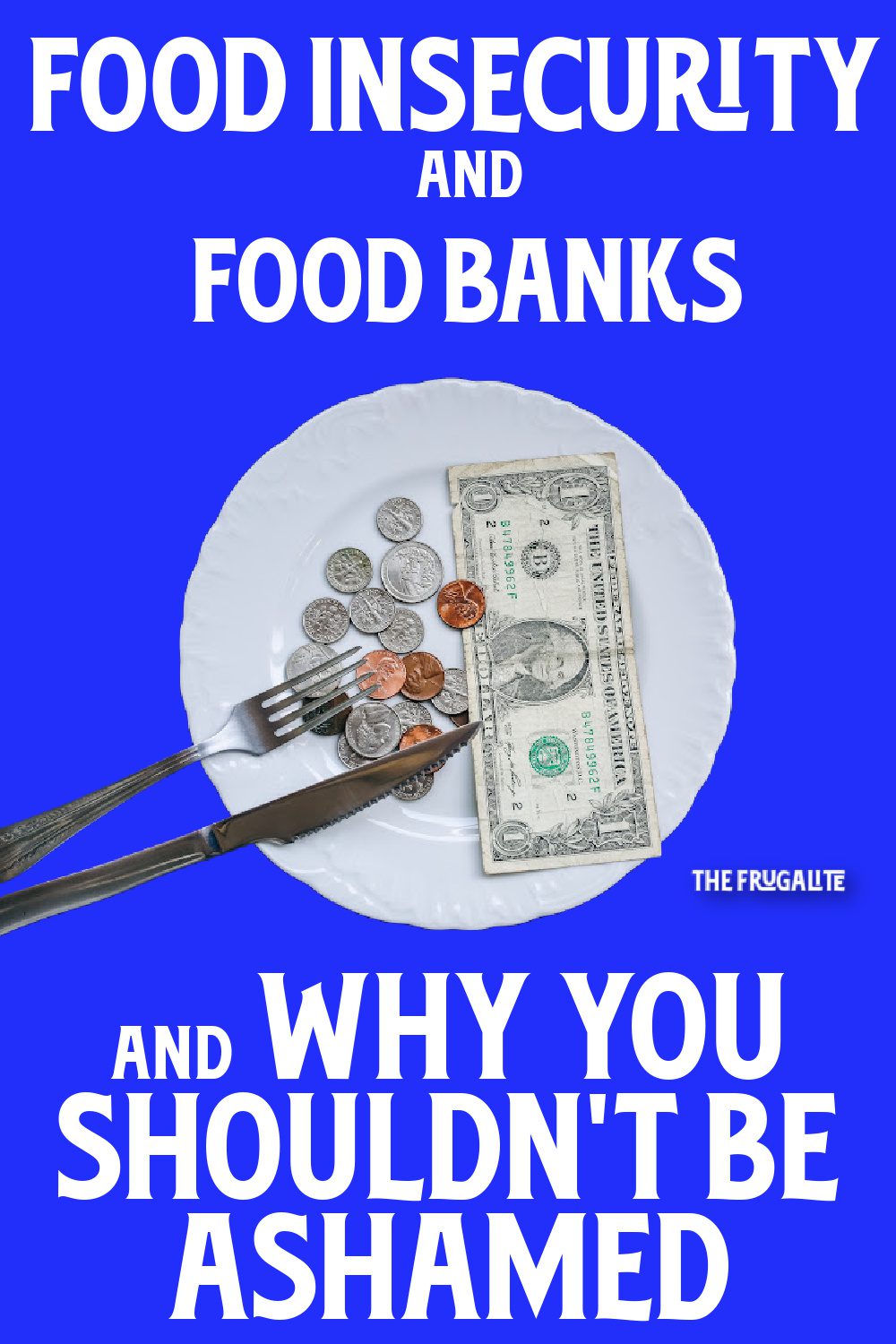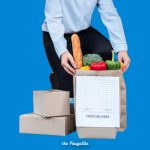(Psst: The FTC wants me to remind you that this website contains affiliate links. That means if you make a purchase from a link you click on, I might receive a small commission. This does not increase the price you’ll pay for that item nor does it decrease the awesomeness of the item. ~ Daisy)
Hey Frugalites, I’m baccckk! Did you miss me? I know I missed all of you! I figure there’s no better way to get back into the swing of things than with a more serious topic – food insecurity. I’ve got to start off strong after all, right? Okay, without further ado, let’s get to it.
So, what exactly going on right now?
So, at this point, unless you’ve been living under a rock for the last few years, you probably know the poor state our economy is in right now. Inflation last year was at a striking high of 4.7%. The highest it’s been in over 30 years. (Since 1989-1990). This year, the average inflation is 8.2% and, unfortunately, still climbing (and it hasn’t been this high since 1981.) And, as Daisy wrote earlier, it’s something that is stressing out the majority of Americans. While I live in Canada, not the US, our inflation rates here are almost as bad.
Let’s talk about food insecurity.
So now that we know what inflation has looked like recently let’s take a look at some food insecurity statistics. Some of you may be sitting there reading this thinking, “Chloe, what the heck is food insecurity? Like, I can probably guess what it is, but there are statistics about it?” (Which, let me assure you, is totally normal! I didn’t discover the exact term until I was doing research for this article myself).
The Merriam-Webster dictionary defines food insecurity as:
food insecurity
noun
plural food insecurities: the fact or an instance of being unable to consistently access or afford adequate food
The USDA defines food insecurity as a household’s inability to provide enough food for each person to live an active, healthy lifestyle.
In 2020 and 2021, food insecurity rates per household were 10.5% and 10.2%, respectively. While that may not sound huge in percentages, that 10.2% of last year is a whopping 13.5 million households. (P.S. the average US household has over three people, so that’s over 40 million people who worry about where they’ll be getting one of life’s necessities. Over 5 million of them are children.)
That being said, the number of people who turned to food banks or other charitable food assistance programs was estimated to be over 60 million people in 2020 (an increase of 50% from 2019), and the number has only climbed since. If you’re one of the literal millions of people who used one of these services this year or in the past, you’re not alone. If you’re in need of those services or help but are too ashamed or embarrassed to reach out. Don’t be.
You’re not alone.
I get what it’s like, though. That feeling of guilt that others may need more help, or that you’re not good enough, or not trying hard enough. Those thoughts that you’re just a burden on society or that people like you don’t go to food banks or ask for help. I get it. I mean, I really get it. Being an adult in my late 20s, I found myself, for the first time needing to rely on these services myself. And, I’ll tell you, it wasn’t easy. I had all those negative and unhelpful thoughts and so many more. Especially the first time. For the record, I’ve been to the food bank three times this year since June.
The thing is, there is nothing wrong with needing help. With things like inflation, homelessness, food insecurity, and, well, the economy as a whole in bad shape right now, it’s no wonder a lot of people need help right now, and you are just as worthy of it as the next person.
Before writing this article, there have only been a handful of people I’ve told about my trips to the food bank. I won’t lie; I was still struggling with embarrassment. When I came up with the idea for the article, a small part of me didn’t want to write it, didn’t want to let people know how far I’d fallen. That’s when I stopped and really thought for a second, though. If I’m feeling like this, and I am someone who is often fully open and honest with my feelings, struggles, and experiences, well, it’s going to be something that may help people who have the same struggles. To let them know they’re not alone. If I can even help just one or two people by sharing my story and experience, then that’s what I’ll do.
So, how do you find the help you need?
There are resources and programs available all across the US and Canada, as well as in many other countries.
United States
211
If you’ve never heard of 211 before, it’s an amazing resource. Calling 211 on your phone is kind of similar to calling 911 on your phone. The biggest difference is the operator you get on the other end of the line will help you with local information and essential community services. Don’t know where the nearest food bank is? Need shelter? Struggling financially? 211 has a list of available resources, and when you call, you’ll get connected with your local branch. Give them a summary of your issues, and they’ll give you as many resources to follow up on as they can.
FoodPantries.org
Food Pantries is a US-based website that will pull up most, if not all, local resources related to getting the food you need. This includes everything from food banks and pantries all the way up to things like local soup kitchens. Just select the state you live in, and it will show you a list of all the services broken down by town or city.
FeedingAmerica.org
Feeding America is a national organization and charity focused on helping those across the country to get the support and help that they need so they do not have to go hungry. It’s probably one of the better-known resources out there. With Feeding America, though, you can search by zip code, and they also have other great resources to help support people of all ages. They help with many school breakfast programs, as well as seniors, and in some cases, they’re even able to arrange food to be delivered to those in need but who are unable to get to their local food bank. They’ve even paired with Google this season to try to help even more people.
Canada
211
211 in Canada is essentially the same as it is in the United States. If you’re in need of non-emergency local support, ring them up, and they’ll give you the info you need to get the support and resources you need, and support with food is only the tip of the iceberg. I’ve used this service many times while living in Canada, and it’s absolutely fantastic.
Food Banks Canada
Food Banks Canada is a great resource for quickly looking up support near you. You can search with their interactive map by town, province, or postal code.
One more thing…
While I’m all for frugality and saving money where I can, I do want to stress that these available supports are not there so that you can save a few bucks on groceries that you could otherwise afford. They’re there to help the people who can’t afford food or are going without necessities because there just isn’t enough money to support themselves and their loved ones.
While I am all for using every resource available to me, this is one of those things that I don’t use unless I need to.
The support is there.
When you need support, it is there. While I may not know much about the logistics for countries outside of North America, I know there are many resources available all over the world when it comes to food insecurity. All you have to do is reach out and ask for help. It might not be easy that first time, or even the second or third, but remember, you are not alone. We are in a global crisis, and it will take worldwide community support to pull us out of it.
If you are in a position to help, donating to your local food bank or food charity is an incredible way to do so. It doesn’t have to be much. When I was a kid, my mom used to let us pick out one can of spaghetti sauce and a pack of pasta every week at the store to donate, telling us that we just gave one person a hot meal. Every little bit really does help.
If you would like to share your experiences, tips, or advice, or if you know of any other great resources, I encourage you to share them in the comments. It’s one of those things that, in order to end the stigma, we have to talk about it. I encourage you to share your story, like I did, to help others know that they’re not alone.
About Chloe Morgan
Chloe Morgan grew up living with a tight budget. In her late teens and early 20’s all the lessons she’d learned started to slip, like it does for many college age students on their own for the first time, and with their first credit card. As she’s gotten older, she’s started to deal with the repercussions and has taken on a frugal way of living, keeping her costs low, as she pays off debt and saves for her future. Chloe lives in Northern Ontario, Canada, with her cute dog, Rhea.












12 thoughts on “Food Insecurity, Food Banks, and Why You Shouldn’t Be Ashamed”
Good article! It is helpful.
Thank you for being straight forward on a sensitive subject, in particular, for sharing your personal journey related to this subject.
Thanks for starting this conversation. Hubby has been retired for 25 years. i retired seven years ago with another cancer diagnosis. Hubby’s health was never that good, but he always managed to work at our own business, but always part time due to health issues. We managed to pay off our house and be debt free too at retirement time, but with not much saved. WE were doing fine until the inflation hit. I absolutely know it is more than the official narrative. The things we buy: food and gas are up way more. Anyway, we started going to the food banks about two years ago. They are a God-send. There are actually four in our area and we could go to all of them if we wanted to. We choose to go to one about once a week. We can pick out what we want there, so there is no waste like getting a pre-picked food box (tried that and donated back what we couldn’t use). The people there are extremely friendly and kind. They have a great selection that always included beans, rice, canned goods, meat, and fresh produce from the local growers. There are usually nuts, dried fruit, some goodies, cereal, etc. The only thing in short supply lately is dairy products. There is another one in the area that has people line up outside and wait for up to a half an hour. I can’t stand long, so we rarely go there. Plus now that it is colder, it is an ordeal. Another one is a drive-thru, that we tried during covid, but so much of what they give I can’t use and spent strength i didn’t have donating it back to a food bank. Anyway, this is just to say people are doing it! Don’t be ashamed. At least give it a try if you need the help. They give us enough here for me to put some by canning and such. Food is still plentiful here. Thank God.
Having eaten at food banks myself over the years, I’m a proud part of the local gardening for the food bank initiative. I give all of my garden overage to a bank right up the street from my house, and it gives me a good feeling in my heart to help. Local community helping each other is how it’s been done since the Middle Ages! Government involvement is a relatively new thing, and it’s nice to do without that as much as possible. I agree though: take only what you need. There’s a whole lot of need out there right now!
It is better to get the help from your local foodbank then to run up credit card debt and make your life worse. If you feel bad about it you can also try to volunteer there or at local soup kitchens. No matter how bad things get there is always someone worse off and your smile and help might be what saves them from doing something stupid.
I have used food banks, soup kitchens, and overnight places in the past. Currently, I volunteer as a service organisation member to distribute food once a month. I also sometimes donate supplies and money on behalf of a service organisation to local pantries during a year.
There is no shame in going to a food bank and/or any other assistance (food stamps, free breakfast/lunch at school, TANF etc.). Most of us have paid into the system – either via taxes, prior donations/volunteering, service to our country, and/or relatives’ service to our country. There is no pride in you and/or your family going hungry. It really does matter how or why, it just matters you and yours eat. The pride should be making the best use of the help you get. I love Janie gives back what they can’t use. I know of another blogger (senior citizen) who also passes along what she can’t use. She has to take what she’s given so she makes the best use of it however she’s able (including canning I might add).
I donate money out of my bi-weekly pay to a food pantry (that has a pet food pantry ran by another organization at their site), and a couple of organizations that feed/help/provide shelter/training for the homeless. I also send donations outside of my paycheck. Those who can help should and I can’t think of any place that doesn’t have people in need.
Take care Chloe.
It really does NOT matter how or why, it just matters you and yours eat. Sorry for unintended typo.
A first or second century Christian writing called “The Teaching (Didache) of the Twelve Apostles to the Gentiles” says you have to answnor.er to God for every bit of charity you get. That would refer to those who do not need it–they make donors feel bad, which reduces charity for those who DO need it. And if you do need it and give glory to God for it, then you bestow a blessing on the donor!
I have given some things away to neighbors who really needed it and that felt like an assistance to the pantry in getting the food to truly needy.
~~~~~The other thing is that for me the problem is not so much immediate need, but the urgent need to stock up for the crazy times coming. I can’t quite make ends meet, so having some cans and things gives me a bit more security.
If you cannot go pick up food here in my area you cannot get help with food! Not one agency will help. We need volunteers to help staff food banks and volunteers to deliver food to the folks without transportation and homebound seniors. There is a shortage of employees and volunteers here so every agency is not able to do their mission or jobs and seniors homebound are abandoned. Home health has drastically cut everyone’s hours of service so there is a real crisis. My PCA is only able to go get a few things at the store because she lacks enough time and there is zero time for cleaning for the past two years! The food bank is not open when she is here and they have zero volunteers to deliver food. Cannot get federal Commodities for same reason. I have asked them to leave a box and change delivery location to a community action agency that is open and well staffed all day long so PCAs can go get it. No response yet. I encourage all able bodied folks to volunteer to help homebound in several ways, but all who are able and use or have used food banks can easily give back by volunteering time at the food bank and especially volunteering to deliver food to those who cannot get there and to volunteer to pick up and deliver commodity boxes to homebound seniors. While picking up their own food it would be so easy and take less than a half hour to take food to someone unable to get there due to no transportation or being physically unable, especially seniors who live alone in community with no other help or family. Every food program offered requires the person to go pick it up! I went three months without any access to food last year because home health had no one to send to me! And now up to three weeks at times when no PCA shows up due to canceling. That is why setting food aside is crucial these days, as social systems and programs continue to fail. Things are much worse than most people realize and systems are already collapsing in various areas around the US. Even with the food I had I still lost 40 lbs. because I had to ration the food, not knowing when or if the total lack of support would end. I now get less than 2 hours, down from 6 and they have no plan going forward to restore my hours or anyone else’s hours without enough employees. Prepare while you can, as my help stopped abruptly and completely with no warning.
In my area, it’s the same thing!!!!! If you aren’t a homeless, a drug addict, elderly, a student, military, have kids, you’re effed!!!! I want to pause to say thank you to our men & women serving our country & who have served!!!! There’s nothing for the “rest of us”. I googled, emailed, called around, nothing!!!! Only the “God Boxes”/”Karma Boxes”. My best wishes to “the rest of us” & everyone who can’t buy yummy food
Here are 2 true stories related to me by relatives who were young when the Great Depression hit: My parents lived in different parts of the State and did not know each other unitl after WWII
My Dad’s family were desperately poor before the Depression. My aunt told me that they ate out of soup kitchens a lot. I asked her if they even knew when the Depression hit? “Yes. the soup kitchens closed.” So, folks, if we have a huge financial meltdown, there will likely be no food kitchens or pantries that hand out food. They now rely on donations that will stop.
The next story is from my Mom. Her family was very comfortable. Both my grandparents had college degrees. Very rare then. They lived in the Victorian pre-civil war home with Grandpa’s elderly mother. Grandpa came home on that fateful Friday and asked his mother:
“Mamma, how much money do you have?” I don’t know, Glenn. If you need money go get my purse and I’ll write you a check. “No, Mamma…How much money do you have IN your purse?” I don’t know. Go get my purse.
SHE HAD 38 CENTS IN HER PURSE. Grandpa looked at her and said, “Mamma, that’s all the money you have. The Banks have closed.”
So, folks if you think there is any help coming remember that there wasn’t in 1929 and there won’t be now.
How much money do you have – because everything in the bank or brokerage is ELECTRONS. Flip a switch and – poof- they are gone.
Nothing has changed since then.
And, with a fragile electric grid (read Lights’ Out), bitcoin is also a myth. It depends on vast amounts of electricity.
Everyone will be on their own. Also read One Second After. It will be ugly.